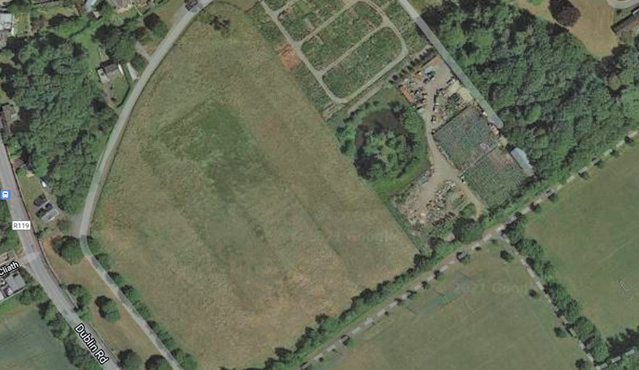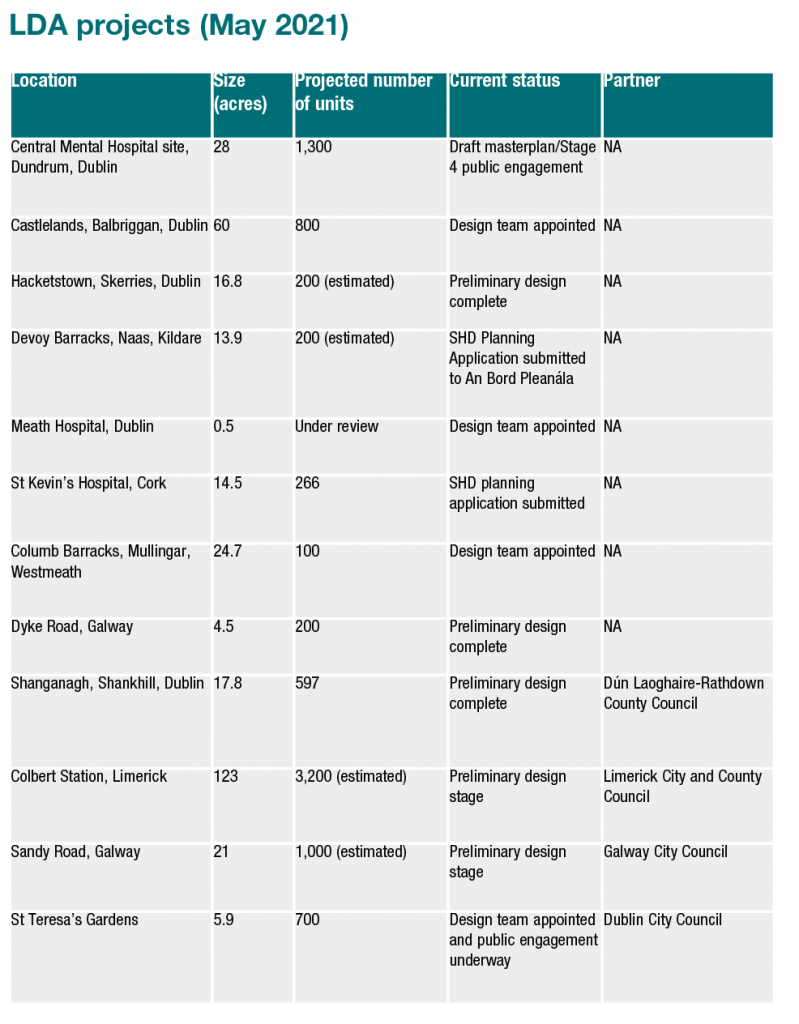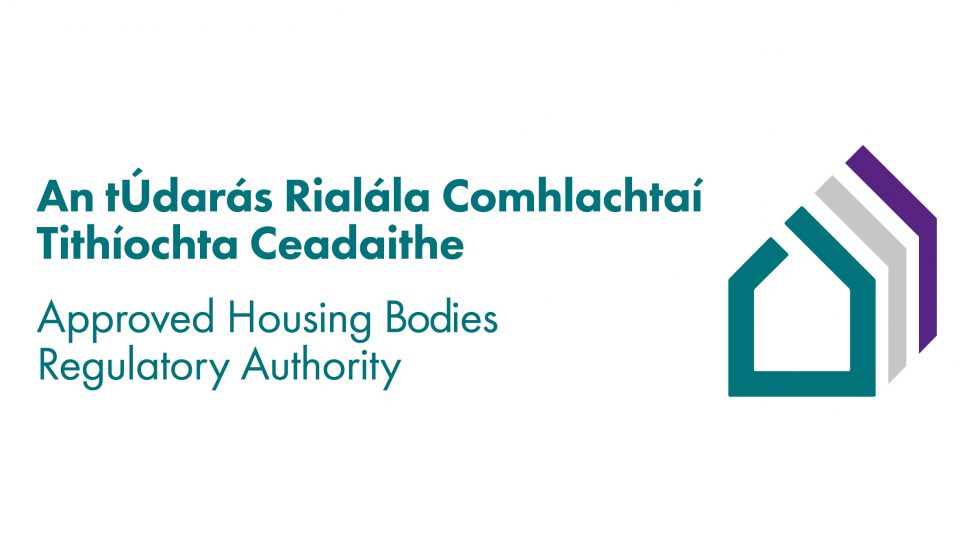
Is cost rental a feasible approach to increasing Ireland’s affordable housing supply?
1st June 2021
Retrofitting Ireland’s homes
1st June 2021Land Development Agency Bill 2021

The Shanganagh Castle site, Shankhill, Dublin.
The Land Development Agency Bill 2021 was published on 5 February 2021 and is intended to provide for the establishment of the Land Development Agency (LDA) under primary legislation.
While established as an interim entity under secondary legislation in September 2018, the 2020 Programme for Government (PfG) commits to placing the LDA on a statutory basis under its Housing for All mission.
Since its establishment, the LDA has been primarily tasked with collaborating with approved housing bodies (AHBs), the 31 local authorities and other relevant public bodies to implement land development strategies to address housing deficiencies.
PfG
“Mindful of the need to properly manage and utilise State-owned lands”, upon its formation, the Government committed to legislating for the LDA “as a matter of urgency”. The PfG indicates that its primary objective will be “to work with government departments, local authorities, state agencies and other stakeholders to assemble strategic sites in urban areas and ensure the sustainable development of social and affordable homes for rent and purchase”.
Among its promise relating to the land management organisation, the Government committed to ensuring that:
• the LDA is tasked with driving strategic land assembly to ensure the sustainable development of new and regenerated communities well-served by essential services;
• the LDA Board includes a cross spectrum of housing, financial, governance and other independent experts;
• the LDA is allocated Compulsory Purchase Order powers;
• the LDA is mandated to work with local authorities, State agencies and other stakeholders to develop masterplans for strategic sites;
• the LDA is subject to Freedom of Information;
• the LDA required to provide regular updates to the Oireachtas;
• the LDA uses modern methods of construction, including offsite construction, to deliver high quality sustainable homes quickly and at scale; and
• the LDA would have first refusal to purchase any State lands being offered for sale.
The Bill
When enacted, the LDA Bill will establish the LDA as a Designated Activity Company (DAC) that will operate as a commercial State entity, initially resourced €1.25 billion from the Ireland Strategic Investment Fund (ISIF), with a borrowing capacity of €1.25 billion.
Aside from the establishment of the LDA, the Land Development Agency Bill 2021 has 16 specific purposes, all relating to the overarching objective of addressing housing demand by increasing the supply of all types of housing across the State, utilising public to do so. These purposes include:
• enabling urgent measures to increase the supply of housing in the State, particularly affordable and social housing;
• enabling the sustainable development of new and regenerated communities;
• developing and regenerating relevant public land for the delivery of housing;
• tackling long-term housing shortage and increasing access to housing in the State;
• promoting best practice in housing development; and
• maintaining balanced land use.
A major objective of the LDA is the delivery of 150,000 new homes by 2040. As of May 2021, the LDA portfolio comprises 12 sites (see table) across the country, eight of which are being directly developed by the land management organisation itself and four of which are being developed in conjunction with local authorities. The eight publicly owned sites have the potential to deliver 3,000 new homes with additional potential for 7,000 new homes.
The Bill provides that the LDA will make 50 per cent of any housing subsequently provided on relevant public land available for affordable housing, with Part V of the Planning and Development Act 2000 obligating an additional 10 per cent (proposed to increase to 20 per cent under the Affordable Housing Bill 2021) for the provision of social and affordable housing.
The Bill also provides that the LDA will have:
• first refusal on the purchase of public land;
• accountability to the Oireachtas; and
• Compulsory Purchase Order powers.
Commentary
Upon publication of the Bill, the LDA stated: “The publication of the Bill is a critical step towards confirming the LDA’s mandate and supports the role that the Agency will play in addressing Ireland’s housing and land management needs. Its enactment will provide a legislative grounding for one of our key strategies of partnering and collaborating with local authorities. The Bill squarely focuses the LDA on improving housing affordability, which is consistent with our approach to date… From a standing start, our work to date has us well positioned to commence the delivery of major new homes projects and to deliver on our forthcoming mandate.”
Publishing the Bill, Housing Minister Darragh O’Brien TD stated: “In response to the pre-legislative scrutiny and by way of amending the initial LDA Bill General Scheme, we have ensured there is greater flexibility on the public lands affordability requirement, more clarity on the transfer of public lands to the LDA including a ‘first refusal’ clause along with appropriate CPO powers for the LDA.
“There is also a specific commitment to sustainable communities and best environmental practise, while the agency will be subject to FOI and enhanced Oireachtas committee accountability.
“Local authorities can transfer lands to the LDA without requiring a council vote, accelerating the process, clearing blockages and driving on development.
“Ultimately, through this Bill, the LDA will be empowered to provide homes for affordable purchase, cost rental and social housing – another step in the Government’s direction of Housing for All.”
Criticism
Speaking with the Housing Magazine, Sinn Féin housing spokesperson Eoin Ó Broin says: “This is a fundamentally bad idea. We desperately need an active land management agency; a non-commercial State agency with significant compulsory purchase order powers and a significant budget to ensure the adequate mobilisation and strategic best use of public land. That is not what we have got in the Bill.
“In fact, the LDA will be able to do almost no strategic land management unless it has the active cooperation of the landowner. It has limited CPO powers and limited land activation functions. Essentially, what the Government is proposing is a State-wide residential developer of urban areas of over 30,000 in population.
“The most revealing thing is when I asked the LDA at a recent Oireachtas Housing Committee what their pipeline of delivery was – when the first homes would be delivered – [it] said that the first homes won’t be delivered until 2023 and it’ll be between 200 and 600 units. It’ll then increase a little bit the following year and [it] should then go north of 1,000 units by 2025. This organisation was set up in 2018 and [it’s] telling us that it won’t have 1,000 units a year until after 2025.
“Local authorities are best placed to deliver large volumes of public homes. They are democratically accountable to their elected members and they know the local housing conditions, system and market… If you want to deliver large volumes of public homes in the most effective way, you wouldn’t have an LDA as an active residential developer, you would have it as an active land management agency working in collaboration with local authorities.”







